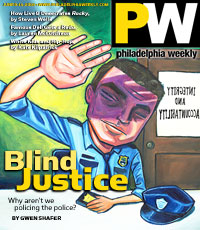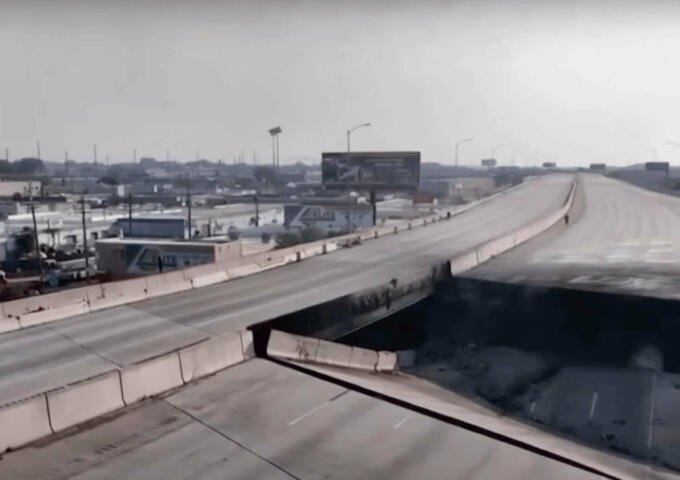
Photographs by Jeff Fusco
During his 14-year stint as a Philadelphia police officer, Jack Baird racked up 23 formal complaints from citizens. They protested that this boisterous, hotheaded cop who worked North Philly’s 39th District planted drugs in their cars while stealing cash from their pockets. They claimed Baird pelted them with both his fists and his words-from racial slurs to death threats. An innocent mother cried when Baird stole $3,120 from a bag hidden under her mattress. A terrified North Philly man could only watch in silence as the cop smashed his furniture with a sledgehammer.
The Internal Affairs Division (IAD) of the Philadelphia Police Department received its first complaint against Baird-known on the street as “Blondie” for his yellow hair and mustache-in 1983. That’s when he shot and killed Patricia Tucker, a 38-year-old black woman.
The circumstances surrounding this incident would’ve ended the career of most cops working in other cities. But like with nearly all the grievances filed against Baird over the following eight years, Internal Affairs investigators deemed this one “not sustained.”
Even as the complaints stacked up, Baird’s supervisor draped him in praise. A review written in October 1989 characterized him as “a tremendous asset to the squad” who possessed “valuable knowledge of the job.”
Baird’s brutal rampage finally ended in 1991. That’s when the Police Department acted on a complaint lodged by a 25-year-old Temple criminal justice major.
Arthur Colbert had never broken the law, but that didn’t deter Baird and his partner. On Feb. 24, 1991, the rogue cops snatched Colbert off West Ontario Street and took him to an abandoned North Philadelphia row home, where they beat him, accused him of selling cocaine and shoved a cocked gun in his face.
The next morning Colbert confidently marched into the 39th District building. His story ripped the lid off what would become Philadelphia’s most damaging police corruption scandal. The city eventually coughed up $5 million to settle wrongful arrest suits, and tossed out hundreds of criminal convictions based on testimony from officers working in the 39th District.
Juries ultimately sent eight cops to the slammer. Baird, deemed the mastermind of the corruption ring, was sentenced to 12 years with no chance of parole.
So it’s more than a bit ironic that “Wacky Jacky” Baird, now 50, today manages a website that focuses on exposing misconduct by police officers and other public officials.
A recent visit to the Undercover News Incorporated homepage turned up video footage of an off-duty Camden County police officer downing nine pints of Coors Light at a bar before climbing behind the wheel of his car. Also posted were dozens of articles detailing criminal charges filed against law enforcement officers, ranging from New York cops who conspired with the mob to California border patrol agents convicted of extortion.
Baird is also a “senior investigator” for a Washington, D.C.-based nonprofit called the Police Complaint Center. “We assist with the filing of complaints because we believe that accountability is critical to the public service mission of police organizations,” the center’s literature explains.
On the surface at least, it appears Baird has made a remarkable transformation.
Has the Philadelphia Police Department, which turned a blind eye to misconduct for decades, done the same?
Some former critics of the force-as well as Mayor Street-apparently believe things have improved so much that court-ordered oversight of the Police Department is unnecessary.
Last month Jerry Mondesire, president of the Philadelphia chapter of the National Association for the Advancement of Colored People (NAACP), said significant reforms put in place in 1996 have patched what had once been a gaping hole in police integrity. He also said he believes outside monitoring of the Police Department is no longer needed, and that he planned to petition U.S. District Judge Stewart Dalzell to end it.
It isn’t mere coincidence that Mondesire’s pronouncement coincides with the city’s search for a new anticorruption czar. Attorney Ellen Green-Ceisler served as the city’s Integrity and Accountability Officer (IAO) for five years prior to her resignation in February.
 Green-Ceisler’s reports on officer-involved shootings, narcotics enforcement and police discipline kicked up dust in the corridors of City Hall. And the muck has been slow to settle. Certainly Mayor Street appears to be in no rush to appoint Green-Ceisler’s successor.
Green-Ceisler’s reports on officer-involved shootings, narcotics enforcement and police discipline kicked up dust in the corridors of City Hall. And the muck has been slow to settle. Certainly Mayor Street appears to be in no rush to appoint Green-Ceisler’s successor.




